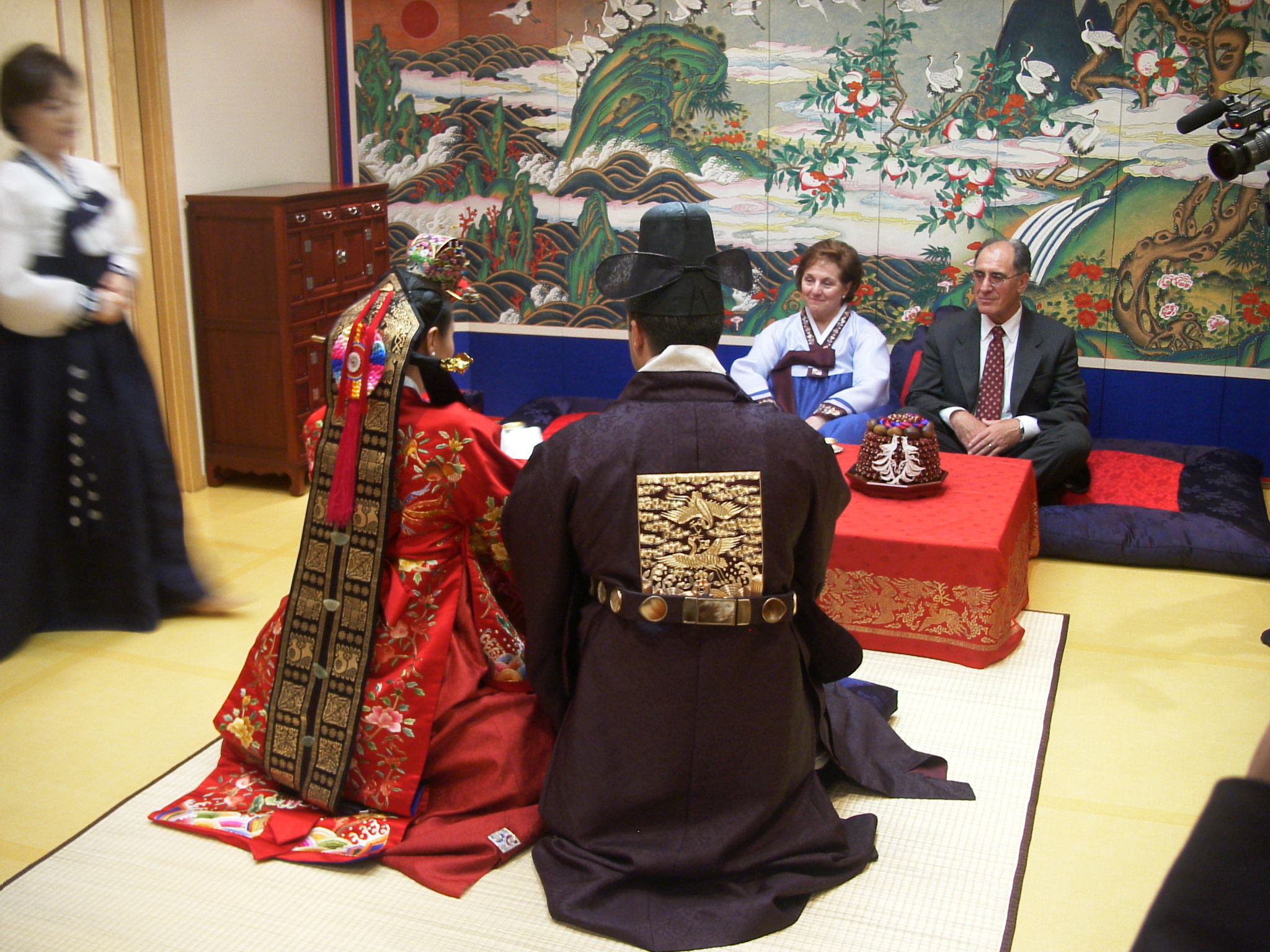This is a reprint of the article that was published in Daily Yomiuri on June 24, 2004.
Wataru Doi Special to The Daily Yomiuri
(Seoul/Korea) At his South Korean friend's wedding reception in Seoul, 36-year-old Japanese Ken Sakata was puzzled. Although he gathered as much information as possible and he thought he could fully prepare for a Korean-style wedding, he missed one thing. Seating was free in the reception room and guests could sit anywhere they desired. It was quite different from Japan, where seats are assigned to each guest.
Since they cohosted the soccer World Cup finals in 2002, the cultural distance between the two nations has been shrinking. However, cultural differences still divide the two, as Sakata experienced.
At the reception, tables were filled with South Korean relatives and friends of the bridal couple, and it was a big challenge for Sakata to join them. To his relief, he eventually found a few seats reserved for overseas guests.
He had another surprise. The program of the reception was almost the same as that of a typical Japanese wedding. However, as soon as the French dinner was finished and coffee was served, the guests left the venue and went home, whereas in Japan they stay on for speeches and songs.
Korean behavior is based on the kenchana spirit, says Masakatsu Nabekura, who worked for Seoul's Shilla Hotel for eight years and now works for the Hotel Okura in Tokyo. "In order to understand Koreans, foreigners have to understand this concept."
Nabekura explains Sakata's experience: "It is important for Japanese to behave according to one's social position. But the kenchana spirit allows Koreans to be easygoing. Hosts welcome and entertain everyone who comes to a party or a reception in the same way regardless of relationship or hierarchy. The amount of gratuity also does not matter."
According to Hideki Noma, a professor of Tokyo University of Foreign Studies who specializes in linguistics, kenchana means, "don't care" or "carefree." Thus, the Korean behavior Sakata encountered could be interpreted to mean, "We don't care about seating or protocol. We just wanted to celebrate the couple."
Unlike Japanese wedding receptions, which prioritize formality, Korean weddings have a carefree dress code. Sakata wore a jacket, but no tie. Some young South Koreans appeared in sports jerseys.
Formal ceremonies are not the only occasions when the kenchana spirit shows up. Kim, who asked that her full name not be used, is a 25-yearold woman working for a travel agency in Seoul who had an odd experience when she and a Japanese dined at a Korean restaurant. She ordered soft tofu stew and a variety of kimchi. The food was served in large bowl along with dishes to share.
As usual, Kim ate the stew directly from the bowl with a spoon. She also took kimchi from the dishes with a pair of chopsticks and brought it directly to her mouth.
Photos by Wataru Doi
Traditional Korean Style Wedding
Take away the Hangu signboards and Myongdong,
the biggest commercial district in Seoul,
would look very similar to Shibuya or Shinjuku in Tokyo.
The Japanese needed two spoons to eat the stew. She used one to take her portion to a small dish and the other to bring the stew from the small dish to her mouth. When she ate kimchi, she used one end of her chopsticks to bring her portion to a small dish. Then she turned the chopsticks around and used the other end to eat. She never ate directly from the serving dish.
The visitor was simply following Japanese manners, but it appeared strange to Kim. Nabekura called this a typical example and said most South Koreans would have a hard time adapting to the Japanese way to doing things. Kenchana-spirited Koreans are relaxed about sharing access to the serving dish. Nabekura adds, "Using another spoon or reversing your chopsticks will give Koreans an unfriendly, detached impression."
While the kenchana spirit works positively in many cases, it sometimes works negatively. Kay Cheong, a 32-year-old South Korean businesswoman gave one example. "Someone was asked for a loan by a friend. The lender may not ask the friend to sign a contract, but on the other hand the lender himself may sign a bank contract as the borrower's guarantor. All along the lender may be thinking, 'Kenchana--no worries!'
"Among Koreans, this type of thing actually happens," Cheong added. "Sometimes the lender loses his house, which he has put up as collateral, if the borrower cannot pay back the loan in time. The lender has to pay a high price for his kenchana spirit."
Tatsuhiko Tsukiashi, an assistant professor of Tokyo University of Foreign Studies who specializes in Korean history, said he had noticed such a spirit among South Koreans.
Cheong says: "I did not realize people call it kenchana spirit. But I believe that Koreans do have such a spirit, which makes us more relaxed and open-minded, or even carefree, in many settings."
"When in Rome, do as the Romans do, especially when living in South Korea," Nabekura said. "I think South Korea is the most difficult country to live in if you cannot adjust yourself to the local culture. But it is one of the best countries to live in, as long as you can accept the kenchana spirit."
(This article was written and posted on June 24, 2004)

